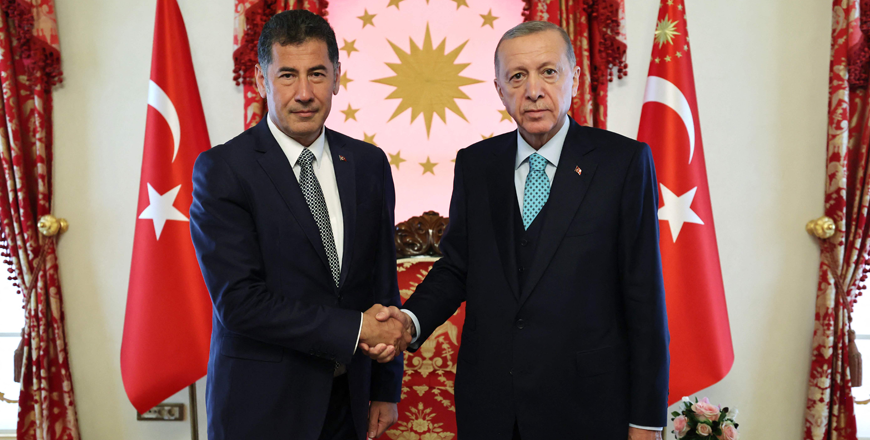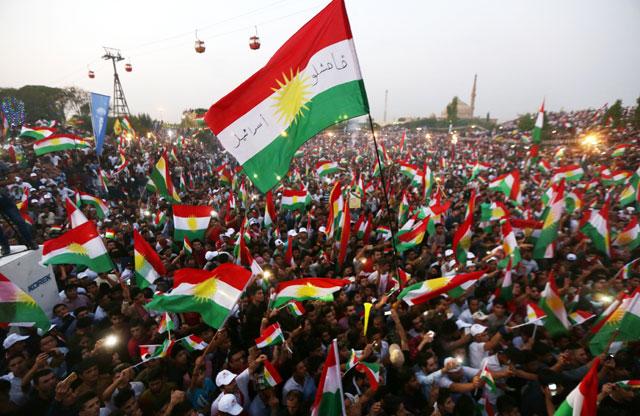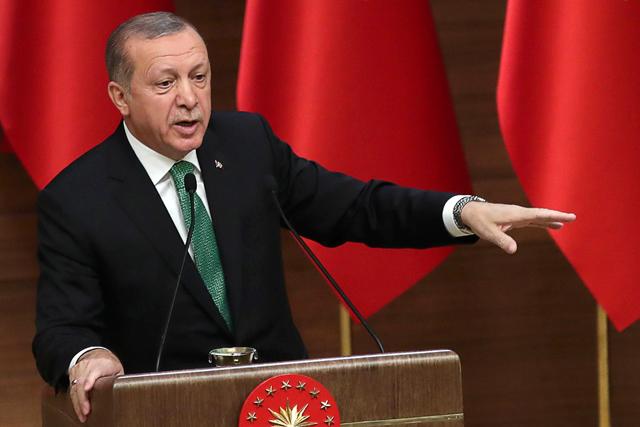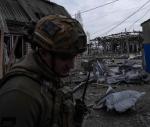You are here
Iraqi, Syrian Kurds divided over Erdogan's election battle
By AFP - May 23,2023 - Last updated at May 23,2023

This handout photograph taken and released on May 19, 2023 shows Turkish President Recep Tayyip Erdogan (right) meeting the former presidential candidate of the ATA Alliance Sinan Ogan at Dolmabahce Office in Istanbul (AFP photo)
ERBIL, Iraq — Turkey's presidential election is being anxiously watched by Kurds in Syria and Iraq as economic interests compete with fears of a regional military escalation against some Kurdish groups.
The long-running and deadly conflict between Ankara and militant groups from the ethnic Kurdish minority has spilled across the borders of both Iraq and Syria.
But Turkey is also a major economic partner for northern Iraq's autonomous Kurdish province which has long exported oil through a pipeline that runs through Turkey and has trade ties worth billions.
"Economically, there are mutual benefits," said Iraqi political scientist Mohamed Ezzedine.
Turkey's President Recep Tayyip Erdogan, having governed for 20 years, has fostered key strategic links with Iraqi Kurdistan's President Nechirvan Barzani, who has been in his post since 2019 after holding senior government positions for decades.
After the first round of elections, Barzani called Erdogan, the Turkish "reis" (chief), to express "confidence and optimism" he would defeat challenger Kemal Kilicdaroglu.
But some Kurds in Iraq and across the border in Syria fear an Erdogan victory will see a military escalation in their home regions.
Fighting between Ankara’s army and Kurdish Workers’ Party (PKK) militants from Turkey has for decades spilled over into Iraqi Kurdistan, a rugged mountain region where both sides operate military bases — with civilians often caught in the crossfire.
In northeast Syria, the Kurdish People’s Protection Units (YPG) have established a semi-autonomous administration amid the chaos of the long-running war, and the group is backed by the United States as part of an anti-extremist coalition.
Ankara, however, considers them an extension of the PKK, which is labelled a terrorist group by Turkey and its key Western allies, and has waged successive military campaigns against them.
‘Mutual benefits’ -
Despite the conflict’s impact in Iraqi Kurdistan, the region also benefits from its neighbour, with trade ties worth an estimated $12 billion in 2022.
Many local businesses would like to keep things the way they are.
“Since Erdogan became president, we have been satisfied,” said Ahmed Krouanji, who runs a shop in Arbil’s market. “There is a lot of trade with Turkey, the economic situation has improved.”
Others express views reflecting solidarity with Kurds across the border.
An Erdogan victory “is not in the interests of the Kurds of Turkey”, said Ali Khodr, a man aged in his thirties.
Turkey’s leading pro-Kurdish party, the People’s Democratic Party, denounces Ankara’s persecution of its Kurdish minority and backs Kilicdaroglu.
But the only consolation for the president’s opponents after first-round voting that delivered the incumbent a comfortable lead, was that for the first time, Erdogan has been forced into a run-off.
Over two decades, Erbil’s leaders have forged close ties with the Turkish president, who receives Nechirvan Barzani and his cousin, Prime Minister Masrour Barzani, on their regular visits to Ankara.
“The government of Kurdistan has always tried to have good relations with Turkey, which is their gateway to the rest of the world,” said Ezzedine. “This affinity was built on economic foundations.”
For years, direct sales of crude to Turkey, without approval from Iraq’s federal government, were the economic lifeblood of Kurdistan.
A legal dispute between Baghdad and Ankara has interrupted the trade, but it is expected to resume once technical and financial details are settled.
‘Start from scratch’
Some fear that a victory for Erdogan risks escalating Turkey’s battle with the PKK, a conflict that has raged since 1984 and killed tens of thousands inside Turkey and extended into northern Iraq and Syria.
The conflict could intensify if Erdogan is elected to another five-year term, said academic Kamel Omar from Sulaimaniyah, the second biggest city in Iraqi Kurdistan.
“The Turkish army will expand its military influence in Kurdistan and penetrate more deeply into the autonomous region,” he predicted.
A similar scenario may loom in northeastern Syria where Turkey’s successive campaigns against the YPG have already forced the Kurdish fighters away from border areas.
“We are afraid that Erdogan will stay in power,” Sardar Abbas, a teacher in the Syrian town of Qamishli, told AFP, adding that he fears the threat of “other attacks”.
“It would be a disaster for our regions,” he said.
He worries that defeat of the YPG would spark an exodus of Syria’s Kurds, who painstakingly fought for their semi-autonomous status.
“It would mean to start from scratch,” he said.
Related Articles
ANKARA — Turkish President Recep Tayyip Erdogan will meet Iraqi Prime Minister Haider Al Abadi during his visit to the United States this we
ANKARA — President Recep Tayyip Erdogan on Tuesday vowed Turkey would thwart any attempt by a Kurdish militia it deems "terrorists" to carve
BAGHDAD — Iraqi Prime Minister Haider Al Abadi met Kurdish regional government counterpart Nechirvan Barzani for the first time on Saturday














